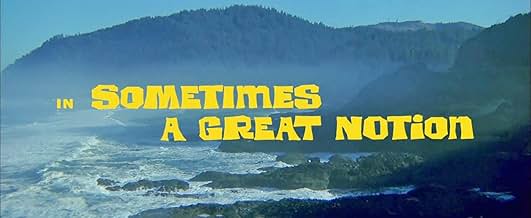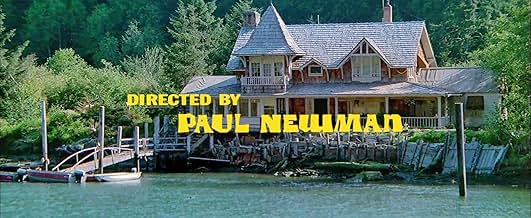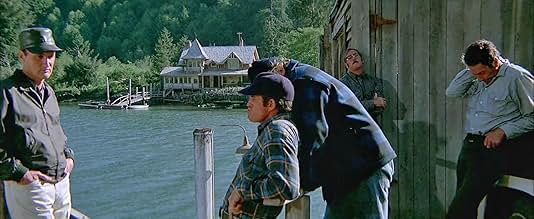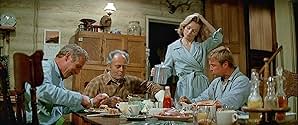IMDb-BEWERTUNG
6,9/10
4826
IHRE BEWERTUNG
Füge eine Handlung in deiner Sprache hinzuA family of fiercely independent Oregon loggers struggles to keep their family business alive amid changing times.A family of fiercely independent Oregon loggers struggles to keep their family business alive amid changing times.A family of fiercely independent Oregon loggers struggles to keep their family business alive amid changing times.
- Für 2 Oscars nominiert
- 2 Nominierungen insgesamt
Empfohlene Bewertungen
A terrific view of life in the late 60s early 70s northwest, before tech moved in. An early Alaska- if you wanted to survive you logged, farmed, fished or worked for Boeing or Kenworth. I had to watch this as a school assignment and was never sorry for it. There are some clumsy moments which I think a movie fan is able to overlook. Sarrazin was kind of an odd addition but wasn't that much of a distraction. I especially liked Jaeckel's role as the comedian. Newman was, well Newman. Pretty much good regardless, as was Fonda. Anyone in the northwest that hasn't seen this should give it look, though it may be hard to find.
Unfortunately, as much as I love Paul Newman as an actor, the movie version of Ken Kesey's incredible book could have used a more seasoned director for its translation to the big screen. The perfect cast (the book even mentions Hank Stamper as looking like a muscular Paul Newman!), and some great performances (Fonda, Jaeckel, Remick), but the story just doesn't come across on film the way it should. I remember the first time I saw this movie was in the late 70's on TV (Portland's KPTV-12). It was so chopped-up for television that the story, character motivations, and ending made no sense at all to me. I loved Kesey's book "Cookoo's Nest" so read the novel of "Sometimes" to try to make some sense of what the story was all about. The book was an amazingly nuanced work of fiction with a great deal of depth and under-story (reading between the lines); none of which I saw on the TV screening. I later rented the video but even with the unedited version of the film, I found the story very lacking and barely comprehensive. I've recently watched the rental again (2005) and found more in the film than I had remembered, but I still feel that unless you've read the book, you can't truly understand what this movie and the character motivations are all about. They're just barely eluded to in the film version. In spite of all that, it's still a worthwhile movie to watch. If nothing else, it chronicles some great, authentic-looking logging footage. If you can, however, read the novel first and then catch the film. Also, if you ever make it to Newport, Oregon, visit the harbor bar "Bay Haven" where the scenes for the "Snag" were filmed. Tell them the old bartender from the "Embarcadero" sent you. ;-)
The date i don't remember, but the day I do. what i did that day i should say. and the movie is still vividly in my mind. I can see the family interplay pretty clearly, but there is 1 scene clearer then all the others.
And more worried about creating a spoiler,
i will only describe it in general terms.
And that is the Death Scene in the picture, I don't want to mention the players in the scene for fear of spoiling it for others. it isn't a short scene, it felt like an eternity, for me anyway.
It is heart wrenching, and has haunted me all these years.
I would like to see this picture again to feel that emotion again.even now just talking around it i feel emotions welling up in me.
worthwhile movie I would recommend it for anyone.
And more worried about creating a spoiler,
i will only describe it in general terms.
And that is the Death Scene in the picture, I don't want to mention the players in the scene for fear of spoiling it for others. it isn't a short scene, it felt like an eternity, for me anyway.
It is heart wrenching, and has haunted me all these years.
I would like to see this picture again to feel that emotion again.even now just talking around it i feel emotions welling up in me.
worthwhile movie I would recommend it for anyone.
I have read Kesey's novel several times over the last 30 years or so. While I see some merit in this movie version, I'd like to see someone have another go at it. The movie only captures the novel in broad strokes. It hits the major point (brother returns to hometown to exact revenge on older sibling), but misses a lot of the flavor. I think Paul Newman, Henry Fonda and Lee Remick were perfect, as were many of the supporting cast. But Michael Sarrazin didn't quite do it for me. Maybe it was the hair, idunno. I always pictured a sort of geeky-looking, bespectacled, beatnick-looking guy with scruffy hair, but still fairly short, and sideburns. Sarrazin probably could have pulled it off, but back in the early 70s, actors were into looking like people from the early 70s.
But more to the point, the movie needed more back-story. We needed to see Johah Stamper "heading west" with young Henry and his brother. We needed to see Jonah fail and surrender to the dampness of the Pacific Northwest and desert his family. We needed to see young Henry take charge ("we're gonna whup her") and begin the logging business that becomes the crux of the story. Also missed were a lot of great scenes when Henry and Leland were children (Henry rescuing Leland from the Devil's Stovepipe, for one). Also missed was the passing of narrative from character to character. One small portion of the novel is actually narrated by a dog. The novel is written, mostly, in the first person from various points of view. There is a little second person narrative at the beginning of most chapters that pull the reader out of the story to offer additional flavor for the surroundings. Obviously, a novel needs to be pared in order to fit into the standard movie length. It would have to be a rather long movie, three hours or so, to portray the texture presented in the novel. But I'd like to see another go at it, maybe even starring Paul Newman as Henry.
But more to the point, the movie needed more back-story. We needed to see Johah Stamper "heading west" with young Henry and his brother. We needed to see Jonah fail and surrender to the dampness of the Pacific Northwest and desert his family. We needed to see young Henry take charge ("we're gonna whup her") and begin the logging business that becomes the crux of the story. Also missed were a lot of great scenes when Henry and Leland were children (Henry rescuing Leland from the Devil's Stovepipe, for one). Also missed was the passing of narrative from character to character. One small portion of the novel is actually narrated by a dog. The novel is written, mostly, in the first person from various points of view. There is a little second person narrative at the beginning of most chapters that pull the reader out of the story to offer additional flavor for the surroundings. Obviously, a novel needs to be pared in order to fit into the standard movie length. It would have to be a rather long movie, three hours or so, to portray the texture presented in the novel. But I'd like to see another go at it, maybe even starring Paul Newman as Henry.
Kesey's superb epic novel with its shifting points of view and verb tense is far too complex a work to adapt directly. Kesey's prose while exceptionally cinematic in its description and action ironically proves unfilmable.
That said, Paul Newman and his production team have created a most admirable and solid, if rather top heavy adaption of Kesey's excellent novel.
The dialogue while rather shallow and weak in spurts (Kesey's rich vernacular is lost)is overcome by a wonderful ensemble cast featuring some of America's finest. Who better that Henry Fonda to play Newman's father? Richard Jaekel richly earns the Oscar nomination as the dim-witted but enthusiastic born again lumberjack Joe-Ben. The famous scene where Newman tries desperately to save Jaekel's character from drowning is heartbreakingly tragic and darkly comic. It is a marvelous example of direction.
Newman spent a great deal of time in my native Oregon researching the part and the film and his homework shows. Kesey's rich descriptions of the land remain largely intact. The sense of time and place is impressively captured in the photography of rusting metal, dripping ferns, rotting wood and mildewed carpets. This is a film that one can almost smell.
Newman is one of the finest artists ever to come out of Hollywood. Not only as an actor, but also as a director. He instinctivly knows how to illicit naturalistic, comfortable and utterly human performances from his casts and Sometimes a Great Notion is no exception. Well worth a look. 7 out of 10 stars.
That said, Paul Newman and his production team have created a most admirable and solid, if rather top heavy adaption of Kesey's excellent novel.
The dialogue while rather shallow and weak in spurts (Kesey's rich vernacular is lost)is overcome by a wonderful ensemble cast featuring some of America's finest. Who better that Henry Fonda to play Newman's father? Richard Jaekel richly earns the Oscar nomination as the dim-witted but enthusiastic born again lumberjack Joe-Ben. The famous scene where Newman tries desperately to save Jaekel's character from drowning is heartbreakingly tragic and darkly comic. It is a marvelous example of direction.
Newman spent a great deal of time in my native Oregon researching the part and the film and his homework shows. Kesey's rich descriptions of the land remain largely intact. The sense of time and place is impressively captured in the photography of rusting metal, dripping ferns, rotting wood and mildewed carpets. This is a film that one can almost smell.
Newman is one of the finest artists ever to come out of Hollywood. Not only as an actor, but also as a director. He instinctivly knows how to illicit naturalistic, comfortable and utterly human performances from his casts and Sometimes a Great Notion is no exception. Well worth a look. 7 out of 10 stars.
Wusstest du schon
- WissenswertesThis was the first film ever shown on HBO when the service premiered in 1972.
- PatzerIn the fox-hunt scene, when the fox jumps over the fence, it becomes apparent that the fox is wearing a 1/4" black collar with a little tiny bell on it.
- Zitate
Hank Stamper: [singing] Don't ever hit your mother with a shovel. It will leave a dull impression on her mind. Paul Newman said the same line in "Butch Cassidy and the Sundance Kid".
- Alternative VersionenIn the earliest video release version, circa 1982, when Leland first arrives, a crane shot reveals Hank looking down below at the family reunion. In the most current VHS release, circa 1994, the crane shot is edited out and replaced with just a single cut from Viv, with an audio bridge to Hank on the roof.
- VerbindungenFeatured in Salut für ...: Salut für Henry Fonda (1978)
- SoundtracksAll His Children
Lyrics by Marilyn Bergman and Alan Bergman
Music by Henry Mancini
Sung by Charley Pride
Top-Auswahl
Melde dich zum Bewerten an und greife auf die Watchlist für personalisierte Empfehlungen zu.
- How long is Sometimes a Great Notion?Powered by Alexa
Details
Box Office
- Budget
- 3.660.000 $ (geschätzt)
- Laufzeit
- 1 Std. 54 Min.(114 min)
- Seitenverhältnis
- 2.35 : 1
Zu dieser Seite beitragen
Bearbeitung vorschlagen oder fehlenden Inhalt hinzufügen

































